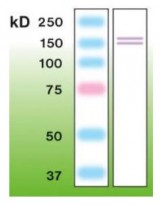ARG10574
anti-iNOS antibody [K13-A]
anti-iNOS antibody [K13-A] for Western blot and Human,Mouse,Rat
Inflammation Study antibody; M1/M2/TAM Marker antibody; Macrophage Marker antibody; M1 macrophage Marker antibody
Overview
| Product Description | Rabbit Monoclonal antibody [K13-A] recognizes iNOS |
|---|---|
| Tested Reactivity | Hu, Ms, Rat |
| Tested Application | WB |
| Host | Rabbit |
| Clonality | Monoclonal |
| Clone | K13-A |
| Isotype | IgG |
| Target Name | iNOS |
| Antigen Species | Human |
| Immunogen | Synthetic peptide derived from Human iNOS. |
| Conjugation | Un-conjugated |
| Alternate Names | HEP-NOS; Inducible NO synthase; INOS; Nitric oxide synthase, inducible; iNOS; Hepatocyte NOS; NOS2A; Peptidyl-cysteine S-nitrosylase NOS2; Inducible NOS; NOS; NOS type II; EC 1.14.13.39 |
Application Instructions
| Application Suggestion |
|
||||
|---|---|---|---|---|---|
| Application Note | * The dilutions indicate recommended starting dilutions and the optimal dilutions or concentrations should be determined by the scientist. |
Properties
| Form | Liquid |
|---|---|
| Purification | Affinity purification with immunogen. |
| Buffer | 20 mM Tris-HCl (pH 8.0), 0.05% Sodium azide and 10 mg/ml BSA. |
| Preservative | 0.05% Sodium azide |
| Stabilizer | 10 mg/ml BSA |
| Storage Instruction | For continuous use, store undiluted antibody at 2-8°C for up to a week. For long-term storage, aliquot and store at -20°C or below. Storage in frost free freezers is not recommended. Avoid repeated freeze/thaw cycles. Suggest spin the vial prior to opening. The antibody solution should be gently mixed before use. |
| Note | For laboratory research only, not for drug, diagnostic or other use. |
Bioinformation
| Database Links | |
|---|---|
| Gene Symbol | NOS2 |
| Gene Full Name | nitric oxide synthase 2, inducible |
| Background | iNOS: Nitric oxide is a reactive free radical which acts as a biologic mediator in several processes, including neurotransmission and antimicrobial and antitumoral activities. Nitric oxide synthase is expressed in liver and is inducible by a combination of lipopolysaccharide and certain cytokines. Three related pseudogenes are located within the Smith-Magenis syndrome region on chromosome 17. [provided by RefSeq, Jul 2008] |
| Function | iNOS produces nitric oxide (NO) which is a messenger molecule with diverse functions throughout the body (PubMed:7531687, PubMed:7544004). In macrophages, NO mediates tumoricidal and bactericidal actions. Also has nitrosylase activity and mediates cysteine S-nitrosylation of cytoplasmic target proteins such PTGS2/COX2. As component of the iNOS-S100A8/9 transnitrosylase complex involved in the selective inflammatory stimulus-dependent S-nitrosylation of GAPDH on 'Cys-247' implicated in regulation of the GAIT complex activity and probably multiple targets including ANXA5, EZR, MSN and VIM (PubMed:25417112). Involved in inflammation, enhances the synthesis of proinflammatory mediators such as IL6 and IL8 (PubMed:19688109). [UniProt] |
| Highlight | Related products: iNOS antibodies; iNOS ELISA Kits; iNOS Duos / Panels; Anti-Rabbit IgG secondary antibodies; Related news: New antibody panels and duos for Tumor immune microenvironment Tumor-Infiltrating Lymphocytes (TILs) Exploring Antiviral Immune Response Anti-SerpinB9 therapy, a new strategy for cancer therapy RIP1 activation and pathogenesis of NASH |
| Research Area | Inflammation Study antibody; M1/M2/TAM Marker antibody; Macrophage Marker antibody; M1 macrophage Marker antibody |
| Calculated MW | 131 kDa |
Images (1) Click the Picture to Zoom In






